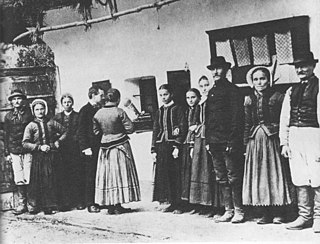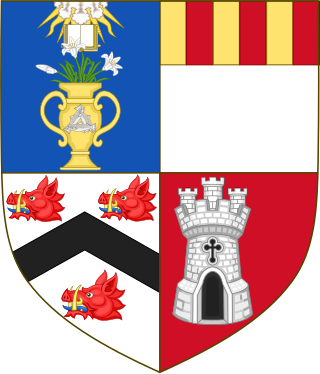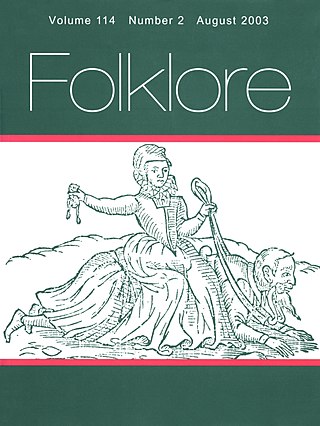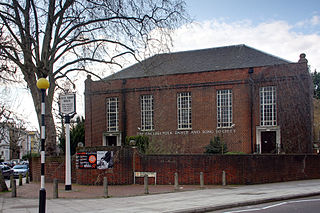Related Research Articles

Folk music is a music genre that includes traditional folk music and the contemporary genre that evolved from the former during the 20th-century folk revival. Some types of folk music may be called world music. Traditional folk music has been defined in several ways: as music transmitted orally, music with unknown composers, music that is played on traditional instruments, music about cultural or national identity, music that changes between generations, music associated with a people's folklore, or music performed by custom over a long period of time. It has been contrasted with commercial and classical styles. The term originated in the 19th century, but folk music extends beyond that.

The University of Aberdeen is a public research university in Aberdeen, Scotland. It was founded in 1495 when William Elphinstone, Bishop of Aberdeen and Chancellor of Scotland, petitioned Pope Alexander VI on behalf of James IV, King of Scots to establish King's College, making it one of Scotland's four ancient universities and the fifth-oldest university in the English-speaking world. Along with the universities of St Andrews, Glasgow, and Edinburgh, the university was part of the Scottish Enlightenment during the 18th century.
When speaking of the music of Syria, it is important to remember that there are certain musical traditions and practices that have been present in Syria longer than others. There have been musical influences introduced into Syria through multiple eras of conquest and influences from surrounding cultures in modern-day Syria. Lying near Egypt and Israel, and connected to southern Europe by the Mediterranean, Syria became host to many distinct cultural musics through trade and route. The music present in Syria is related greatly to poetry, influenced greatly by the Bedouin nomadic tribes, the maqam system in Arabic classical music, as well as influenced greatly by the geopolitical movement and conflict in the Middle East. Syrian music generally has a singer who is accompanied by three or four instruments. The texture is usually thin but can become denser depending on the use of each instrument. Music is tightly linked to poetry in Syria.

Folklore studies is the branch of anthropology devoted to the study of folklore. This term, along with its synonyms, gained currency in the 1950s to distinguish the academic study of traditional culture from the folklore artifacts themselves. It became established as a field across both Europe and North America, coordinating with Volkskunde (German), folkeminner (Norwegian), and folkminnen (Swedish), among others.

Folk plays such as Hoodening, Guising, Mummers Play and Soul Caking are generally verse sketches performed in countryside pubs in European countries, private houses or the open air, at set times of the year such as the Winter or Summer solstices or Christmas and New Year. Many have long traditions, although they are frequently updated to retain their relevance for contemporary audiences.

James Madison Carpenter, born in 1888 in Blacklands, Mississippi, near Booneville, in Prentiss County, was a Methodist minister and scholar of American and British folklore. He received his Bachelor of Arts and Master of Arts degrees from the University of Mississippi, and the Doctor of Philosophy degree from Harvard in 1929. He is best known for his substantial work collecting folk songs in England, Scotland and Wales. He recorded well-known singers and musicians that other folklorists had documented, as well as some never recorded before or since such as Bell Duncan, whose repertoire consisted of some 300 songs, including 65 Child ballads. His collection methods included Dictaphone recordings as well as transcriptions of lyrics.

The Vaughan Williams Memorial Library (VWML) is the library and archive of the English Folk Dance and Song Society (EFDSS), located in the society's London headquarters, Cecil Sharp House. It is a multi-media library comprising books, periodicals, audio-visual materials, photographic images and sound recordings, as well as manuscripts, field notes, transcriptions etc. of a number of collectors of folk music and dance traditions in the British Isles. According to A Dictionary of English Folklore, "... by a gradual process of professionalization the VWML has become the most important concentration of material on traditional song, dance, and music in the country." It is named after Ralph Vaughan Williams, the composer, collector and past president of the EFDSS, who died in 1958.

Maud Karpeles OBE, was a British collector of folksongs and dance teacher.
Joe Heaney was an Irish traditional singer from County Galway, Ireland. He spent most of his adult life abroad, living in England, Scotland and New York City, in the course of which he recorded hundreds of songs.
Wilhelm Fritz Hermann Nicolaisen was a folklorist, linguist, medievalist, scholar of onomastics and literature, educator, and author with specialties in Scottish and American studies.

Stanley Robertson was a Scottish storyteller, author, ballad singer, and piper.
Eduard Yefimovich Alekseyev was an ethnomusicologist who had conducted extensive field research on traditional music in Siberia and other regions of the former Soviet Union. His research focuses on theoretical problems of mode and melodic intonation, timbre, and notations as well as on sociological and psychological aspects of musical perception. He has served as a chairman of the Folklore Commission of the Union of Soviet Composers from 1972 to 1992. He has also served as a director of the department of the General Theory of Folklore at the Moscow State Institute of Art Studies.

"Wha'll be King but Charlie?" also known as The News from Moidart, is a song about Bonnie Prince Charlie, sung to the tune of 'Tidy Woman', a traditional Irish jig the date of which is unclear but the tune was well known by 1745. The lyrics were written by Caroline Nairne. Because Nairne published anonymously, the authorship of this and her other poems and lyrics was once unclear, however, late in her life Nairne identified herself and modern scholars accept that these lyrics are hers. Carolina, Baroness Nairne was a Jacobite from a Jacobite family living at a time when the last remnants of political Jacobitism were fading as Scotland entered a period of Romantic nationalism and literary romanticism. Bonnie Prince Charlie stayed in the house where Caroline Nairne was born and reared when fleeing British capture after losing the Battle of Culloden.
Emily Lyle is a Scottish ballad scholar and senior research fellow in the School of Celtic and Scottish Studies at the University of Edinburgh.

Helen Heffron Roberts (1888–1985) was an American anthropologist and pioneer ethnomusicologist. Her work included the study of the origins and development of music among the Jamaican Maroons, and the Puebloan peoples of the American southwest. Her recordings of ancient Hawaiian meles are archived at the Bernice P. Bishop Museum in Honolulu. Roberts was a protege of Alfred V. Kidder and Franz Boas.
Judith McCulloh was an American folklorist, ethnomusicologist, and university press editor.
Judith Rita Cohen is a Canadian ethnomusicologist, music educator, and performer. Her research interests include Judeo-Spanish (Ladino) songs; medieval and traditional music from the Balkans, Portugal, French Canada, and Yiddish; pan-European balladry; and songs from Crypto-Jewish regions in Portugal. She has received numerous research and travel grants to do fieldwork in Spain, Portugal, Morocco, Israel, Turkey, Greece, France, Belgium, Canada, and the United States, and has published many journal articles, papers, and book chapters. She plays a variety of medieval musical instruments, and sings and performs as part of her lectures and in concerts and solo recitals. She is also the editor of the Alan Lomax Spanish collection maintained by the Association for Cultural Equity.
Edward Fletcher Cass was a British miner, banker and authority on Lancashire folklore, industrial archaeology and the arts who was President of the Manchester Literary and Philosophical Society, Folklore Society, Lancashire and Cheshire Antiquarian Society and Society for Folk Life Studies.
David "Doc" Rowe is a folklorist, author and film-maker who lives and works in the United Kingdom. A graduate of Hornsey College of Arts, he is a prominent lecturer on and advocate for folk traditions and folk music.

Frank Hinchliffe was an English folk singer and farmer. The folklorist Ian Russell described him as one of the finest traditional English singers "heard since the advent of sound recording."
References
- 1 2 3 Russell, Ian (1 April 2006). "Working with Tradition: Towards a Partnership Model of Fieldwork". Folklore. 117 (1): 15–32. doi:10.1080/00155870500479877. ISSN 0015-587X. S2CID 142914051.
- 1 2 Russell, Ian (1977). Traditional singing in west Sheffield, 1970-2 (phd thesis). University of Leeds.
- 1 2 "Recording of the week: Sheffield's pub carols, a secular tradition". blogs.bl.uk. Retrieved 13 November 2021.
- 1 2 "Village Carols > Publications". www.villagecarols.org.uk. Retrieved 13 November 2021.
- ↑ Russell, Ian; Atkinson, David, eds. (2005). "Folk Song: Tradition, Revival and Re-Creation". Béaloideas. 73: 184–186. ISSN 0332-270X. JSTOR 20520890.
- 1 2 "Professor Ian Russell | People | The University of Aberdeen". www.abdn.ac.uk. Retrieved 13 November 2021.
- ↑ "Elphinstone Occasional Publications Series | Elphinstone Institute | The University of Aberdeen". www.abdn.ac.uk. Retrieved 13 November 2021.
- ↑ "North Atlantic Fiddle Convention (NAFCo) | Elphinstone Institute | The University of Aberdeen". www.abdn.ac.uk. Retrieved 13 November 2021.
- ↑ "Professor Ian Russell | Elphinstone Institute | The University of Aberdeen". www.abdn.ac.uk. Retrieved 13 November 2021.
- ↑ "The Coote Lake Medal". The Folklore Society. Retrieved 12 November 2021.
- ↑ "Professor Ian Russell, Village Carols". Points of Light. 21 December 2016. Retrieved 12 November 2021.